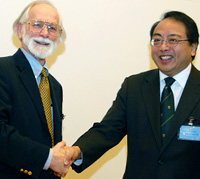
UCSF Chancellor J. Michael Bishop, MD, and University of Hong Kong Vice Chancellor Lap-Chee Tsui, PhD, at the Frontiers in Biomedical Research symposium in December.
UCSF is stepping up efforts to strengthen its relationships and create new partnerships overseas with a particular focus on China, an emerging global leader in science and technology.
An October synthetic biology conference in Hong Kong co-organized by UCSF and a visit there by Chancellor J. Michael Bishop, MD, in December are just the latest examples of the University’s increased interaction with the Chinese scientific community.
“We are in the first stages of reconnecting with people overseas, focusing on Hong Kong and greater China, where we have some friends and donors,” said Brenda Kwee McNulty, UCSF’s director of international development, who noted that official development trips to China by senior University leaders resumed in 2007 after a three-year lapse.
“Our main objective is to introduce and promote the University through international academic and scientific collaboration,” she said. “We’re engaging in more activities, starting conversations.”
Bishop, who has traveled to Hong Kong three times as chancellor, said China has a lot to offer UCSF scientists, including its vast wealth of knowledge surrounding traditional, or alternative, medicine.
“And we have a lot to offer China in return,” he said in a recent phone interview. “They are not happy at all with their precollege science education, and look to us as an example and for help.”
Bishop said he has noticed an increase in collaboration with China over the past several years a trend he said was “only natural” in light of UCSF’s mission of
advancing health worldwide™.
“It’s all consistent with the tagline we adopted; it’s that simple,” he said of the mission statement laid out in the University’s first-ever strategic plan, unveiled in mid-2007.
Bishop’s most recent and likely final trip to China as chancellor took place in early December, when he served as a keynote speaker at the 7th annual Frontiers in Biomedical Research symposium at the University of Hong Kong, where he discussed his lab’s ongoing research into a new way of targeting cancer cells, based on the genetic abnormalities that give rise to the disease. The Dec. 12 symposium drew roughly 800 students, researchers, medical professionals and other individuals from both Hong Kong and overseas.
The chancellor’s visit came on the heels of an international synthetic biology conference in Hong Kong that UCSF and the University-based California Institute for Quantitative Biosciences (QB3) helped organize. Hundreds of researchers from 15 countries attended the October conference, which focused mainly on environmentally friendly, green technologies.
“This wasn’t really about advancing health worldwide; it was more about advancing quality of life worldwide, which is still very much a part of what UCSF is about,” said QB3 Director Regis Kelly, PhD.
Such collaborations “offer UCSF a platform to showcase our faculty, our research and our commitment to public health,” McNulty added.

UCSF Chancellor J. Michael Bishop, MD, stands with other participants in the Frontiers in Biomedical Research symposium in Hong Kong on Dec. 12.
Not all of the interaction between UCSF and China is based on specific events. For example, for the past three years, QB3 has partnered with Peking University to recruit “the best and the brightest” Chinese students to come to UCSF for graduate study, Kelly said. Two current QB3 faculty members are also faculty members at Peking University, serving as a bridge between the two institutions.
In addition, since 2006, the UCSF School of Nursing has been working with the Chinese Ministry of Health, the Chinese Nursing Association and one of China’s most selective medical colleges on a program that will provide scholarships for promising Chinese nurses. Participants in this program will obtain master’s degrees from UCSF, and then return to China to educate and train other aspiring nurses.
Another program pairs the AIDS Research Institute at UCSF with the Chinese Center for Disease Control and Prevention to address the shortage of HIV/AIDS researchers and clinical investigators in China. Through joint research projects, the collaboration also aims to prepare UCSF students to become future leaders and experts in global health, a goal shared by UCSF Global Health Sciences, which also has partnerships in China.
Bishop said he hopes to see UCSF’s ambitious overseas projects continue and expand in the years to come, not only in China but throughout the world.
“Science has long been a global community, and we’re regarded as one of the premier institutions within that community,” he said. “We have a responsibility to reach out and help where we can. And it can be mutually beneficial to everyone involved.”
Closer to home, the UCSF Asian Heart and Vascular Center is working with local Asian communities to improve health by offering education and outreach programs and developing partnerships with policymakers and existing Bay Area organizations.
Both photos courtesy of the University of Hong Kong
Related Links:
California Institute for Quantitative Biosciences (QB3)
AIDS Research Institute at UCSF
UCSF Unveils Strategic Plan to Guide Its Global Leadership in Advancing Health
UCSF Strategic Plan Website, June 28, 2007
UCSF Opens First Asian Heart and Vascular Center in the United States
UCSF Today, May 15, 2006
Gift Funds Program to Train Chinese Nursing Leaders
UCSF Philanthropy Insider, March 2006

